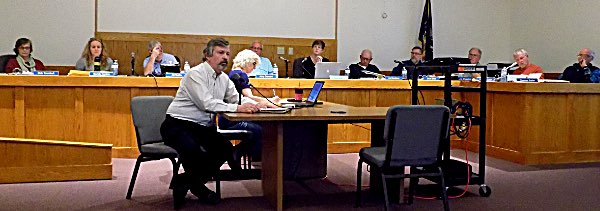- By Dan Veaner
- News
 Print
Print  Town Supervisor Ed LaVigne (front) lays out a three-point plan to make communicating between boards and the public more effective.
Town Supervisor Ed LaVigne (front) lays out a three-point plan to make communicating between boards and the public more effective.Lansing Supervisor Ed LaVigne told the town Planning Board Monday that members of all the Lansing boards will be required to attend training sessions to improve municipal interaction with the public. LaVigne said the training is one of three measures being taken to include town residents and insure they are being heard. Town Board, Planning Board and Zoning Board of Appeals members will be required to attend the training. LaVigne said that any town employees will also be welcome to attend.
"Right now this is not a matter of transparency," he said. "It is a matter of communication. How we communicate to our public, whether it be through taping (Town Board) meetings so people can watch those at their convenience, whether we do it posting on the Web sites, posting on Swift 911... how we can communicate with our citizens about what's going on in our town, but also reminding them that democracy is an act of participation."
The first portion of the initiative is to improve the sound system in the town courtroom. LaVigne said that a test of the existing system showed failing speakers, and an amplifier operating at only 40% efficiency. He said that up to $1,700 has been approved by the Town Board for new microphones and sound equipment. Patrick Tyrrell, who handles IT for the Town, says that equipment will be replaced.
"We are buying new JBL speakers, 16 channel mixer and new amp," he says. "Apparently our amp was under powered and speakers are the old paper cone type. We are hoping this will greatly improve sound quality. Mics may come later but we are going to try this for now."
The second element is the training. LaVigne reported that the Town Board unanimously approved the mandatory sessions. he said this was partially motivated by an incident during 'Privilege of the Floor' when he was rustling papers while a resident addressed the board. LaVigne said that he was not aware that the rustling was picked up by the sound system, and the speaker felt he was being disrespected. LaVigne said he has publicly apologized to the resident, and the incident was a 'teachable moment'.
He told the Planning board that he and the CJ Randall, the Town's new Director of Planning, will be developing the mandatory course for board members.
"So we have two of the three aspects addressed already," LaVigne said. "One of them is how our infrastructure works, and we're constantly improving that. The second one is we, as board members, regardless of which board it is, can interact better with our residents, and do our job better. There will be multiple times to have these to educate ourselves as to how we, as board members, conduct ourselves in front of the public. Also how we interact with the public. Also how we interact with the public that refuses to interact with us -- a variety of those things."
The third piece is to make it perfectly clear what procedures are when the public speaks at municipal meetings. The rules for 'Privilege of the Floor' were printed and distributed on the courtroom chairs, and at a table at the entrance to the room. These rules, with some variations, are fairly common for municipal meetings. In Cayuga Heights, for example, speakers are limited to two minutes with a total of 30 minutes allotted for public comment as opposed to three minutes in Lansing. Despite the fact that these rules have been in effect for years, they have not always been clearly explained. Confusion by speakers about the purpose of 'Privilege of the Floor' and what is expected of them has caused conflict.
"One of the things we've done as a Town Board in the last few months is to post the Privilege of the Floor rules," LaVigne said. "What that does is give continuity to what is expected in the behavior of the public. There are sheets there for you, and feel free to take those home."
Speakers are allowed three minutes, non-transferable, to address Lansing boards during the 'Privilege of the Floor' portion of meetings. Speakers must be recognized by the meeting chairperson, and provide their name and address, stepping to the front of the room where a microphone is provided for speakers. Those who exceed the three minute period may be escorted from the meeting room, and their comments may be expunged from the record.
Many times speakers ask questions of a board, but 'Privilege of the Floor' is intended for board members to listen, not to speak themselves. LaVigne has enforced this policy in Town Board meetings, but has sometimes responded, or invited other board members to respond later in the meeting.
LaVigne said he wants to encourage the public to participate in town government, by sending letters or email to be included in the public record and considered by board members, as well as phoning, texting, or speaking to board members in person.
After closing a public hearing on a particularly controversial project, Planning Board Chairman Jerry Caward encouraged the public to submit comments in email or by regular mail, promising that the board would carefully consider the public input.
LaVigne said public input is especially valuable now, because town zoning is being evaluated.
"As the zoning process moves forward after our Comprehensive Plan was approved, there will be plenty of times for dialog, for input, for careful thought as we move forward," he said. "People can have constructive dialog. They can share their views. And all of the boards can be better equipped to do their jobs."
v15i16



